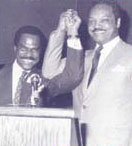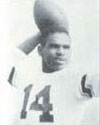Reginald Lewis
BY MICHAEL PAUL WILLIAMS
TIMES-DISPATCH STAFF
| The Times of Reginald Lewis
1942 1968 1971 1977 1987 1993 |
Before his untimely death at age 50, Reginald Lewis would make his mark as one of the most savvy and dynamic entrepreneurs of his generation. A Virginia State College graduate, he was the wealthiest African-American in the country, amassing a personal fortune estimated at $400 million. Lewis was chairman of TLC Beatrice International Holdings, the nation’s largest black-owned business, with revenues of more than $1 billion. Lewis detested and defied pigeonholes. He demanded to be judged by his performance rather than by his skin color.
''It's understandable that (my race) is something people focus on,'' he told the Los Angeles Times in 1988. ''But what I focus on and what others focus on are two different things. I focus on doing a first-rate job on a consistent basis . . . I would say my race hasn't been a factor one way or the other.''
But Lewis was acutely aware of racism, and used it for motivation. His success, he believed, was the most resounding response to those who would stereotype him.
Reginald Francis Lewis was born in Baltimore on Dec. 7, 1942. He acquired his first job at age 10, delivering the Baltimore African-American newspaper. During one summer when Lewis was away at camp, his mother delivered the route for him. When Lewis returned, he asked his mother for his profits. She refused, saying she'd done all the work.
Young Lewis threatened to sue his mother. His mother finally agreed to give Lewis the money, but not before imparting an important business lesson: "Set your terms up front."
Lewis earned a football scholarship at Virginia State (now Virginia State University) but a shoulder injury shelved his career as a quarterback. Lewis had struggled in the classroom early on. But with football pushed aside, he began applying his trademark tenacity toward his books and earned a degree in economics.
During a summer minority program at Harvard Law School, he so impressed professors there that he was granted admission without taking the entrance exam.
He finished Harvard in 1968 and began practicing law in Manhattan. By 1983 he had set up the TLC Group so he could buy and sell companies. In his first major deal he bought a struggling company for $22.5 million, restored it to financial health and sold it after four years for $90 million.
 |
 |
| Lewis with Jesse Jackson in 1968 |
Lewis playing quarterback at Baltimore's Dunbar High School |
Then, in 1987, Lewis engineered the largest leveraged buyout ever of an international company when he acquired Beatrice, a France-based food company, for $985 million.
Intense and demanding, Lewis was also generous. He gave freely to his alma mater, Virginia State, donated $1 million to Howard University, and gave a $3 million gift to Harvard Law School, which named its international law school after him. He also supported numerous African-American politicians, including Jesse Jackson and L. Douglas Wilder.
Lewis died of brain cancer in January 1993, leaving behind his wife, Loida, and daughters Leslie and Christina.
In eulogizing him, Bill Cosby wrote that Lewis ''is to me what Joe Louis is to me. What Jackie Robinson is to me. Regardless of race, color, or creed, we are all dealt a hand to play in this game of life. And believe me, Reg Lewis played the hell out of his hand.''
SOURCES: Why Should White Guys Have All the Fun? by Reginald F. Lewis and Blair S. Walker; Black Enterprise magazine; The Washington Post

